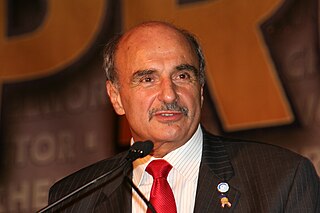Related Research Articles

David Dubinsky was a Belarusian-born American labor leader and politician. He served as president of the International Ladies Garment Workers Union (ILGWU) between 1932 and 1966, took part in the creation of the CIO, and was one of the founders of the American Labor Party and the Liberal Party of New York.

Philip Murray was a Scottish-born steelworker and an American labor leader. He was the first president of the Steel Workers Organizing Committee (SWOC), the first president of the United Steelworkers of America (USWA), and the longest-serving president of the Congress of Industrial Organizations (CIO).

The United Steel, Paper and Forestry, Rubber, Manufacturing, Energy, Allied Industrial and Service Workers International Union, commonly known as the United Steelworkers (USW), is a general trade union with members across North America. Headquartered in Pittsburgh, the United Steelworkers represents workers in Canada, the Caribbean, and the United States. The United Steelworkers represent workers in a diverse range of industries, including primary and fabricated metals, paper, chemicals, glass, rubber, heavy-duty conveyor belting, tires, transportation, utilities, container industries, pharmaceuticals, call centers and health care.
Iorwith Wilbur Abel, better known as I. W. Abel, was an American labor leader.

The Steel Strike of 1919 was an attempt by the American Federation of Labor to organize the leading company, United States Steel, in the American steel industry. The AFL formed a coalition of 24 unions, all of which had grown rapidly during World War I. In the lead role would be the Amalgamated Association of Iron, Steel and Tin Workers (AA) with a five-member steering committee. The strike began on September 22, 1919, and finally collapsed on January 8, 1920. The opposition led by Elbert H. Gary, president of U.S. Steel had triumphed.
The Steel Workers Organizing Committee (SWOC) was one of two precursor labor organizations to the United Steelworkers. It was formed by the CIO on June 7, 1936. It disbanded in 1942 to become the United Steel Workers of America. The Steel Labor was the official paper of SWOC.

Amalgamated Association of Iron and Steel Workers (AA) was an American labor union formed in 1876 to represent iron and steel workers. It partnered with the Steel Workers Organizing Committee of the CIO, in November 1935. Both organizations disbanded May 22, 1942, to form a new organization, the United Steelworkers.
Lynn Russell Williams was a Canadian labour leader best remembered as the International President of the United Steelworkers union (USW) from 1983 until his retirement in 1994. Williams was the first Canadian to head a major North American industrial union.
George Becker was a steelworker, American labor leader and president of the United Steelworkers (USW) from 1993 to 2001. During his tenure as president of the Steelworkers, Becker also served as a vice president of the AFL-CIO.

Leo W. Gerard is a retired steelworker and Canadian and American labor leader. He was elected president of the United Steelworkers (USW) in 2001, becoming the second Canadian to head the union. He served in the role until July 2019. He also served on the Executive Council of the AFL-CIO.
Lloyd McBride was an American labor leader and president of the United Steelworkers of America from 1977 to 1983.
David John McDonald was an American labor leader and president of the United Steelworkers of America from 1952 to 1965.
Bernard Kleiman (1928-2006) was an American lawyer.
The Sons of Vulcan was an American labor union which existed from 1858 until 1876. The union recruited puddlers, skilled craftsmen who manipulated pig iron to create steel. In the 1870s, it was the strongest union in the United States. It merged with two other iron and steel unions in 1876 to form the Amalgamated Association of Iron and Steel Workers—the forerunner of the United Steelworkers.

William M. George is an American labor union activist and political leader who served as President of the Pennsylvania AFL–CIO from 1990 to 2010.

The Pennsylvania AFL–CIO is a federation of labor unions in the U.S. state of Pennsylvania in the United States. It is an affiliate of the AFL–CIO. It was formed on June 9, 1960, by the merger of two predecessor bodies, the Pennsylvania Federation of Labor and the Pennsylvania Industrial Union Council. It can trace its history through its predecessor bodies to 1890.

The Congress of Industrial Organizations (CIO) was a federation of unions that organized workers in industrial unions in the United States and Canada from 1935 to 1955. Originally created in 1935 as a committee within the American Federation of Labor (AFL) by John L. Lewis, a leader of the United Mine Workers (UMW), and called the Committee for Industrial Organization. Its name was changed in 1938 when it broke away from the AFL. It focused on organizing unskilled workers, who had been ignored by most of the AFL unions.
Meyer Bernstein (1914–1985) was a 20th-Century American labor leader and educator who worked for the Steel Workers Organizing Committee (SWOC), the United Steel Workers of America (USWA), the U.S. Department of Labor, and the United Mine Workers of America (UMW).
Harold J. Ruttenberg was an American labor activist for the Congress of Industrial Organizations's Steel Workers Organizing Committee (SWOC) and later United Steel Workers of America (USWA), who in 1946 left labor for management and became an "outspoken" business executive in the steel industry.

Leon Lynch was an American trade union leader. He was the first African American to be an international vice president of any major labor union, serving in that role for the United Steelworkers from 1976 to 2006. He was elected to the Executive Council of the AFL-CIO in 1995 and served on that body until he retired in 2008. He was co-chair of the A. Philip Randolph Institute and a member of the Democratic National Committee.
References
- 1 2 3 "Mike Tighe, Man of Steel, Dead at 82 After Stroke, Served Union for 64 Years". Pittsburgh Sun-Telegraph. August 6, 1940.